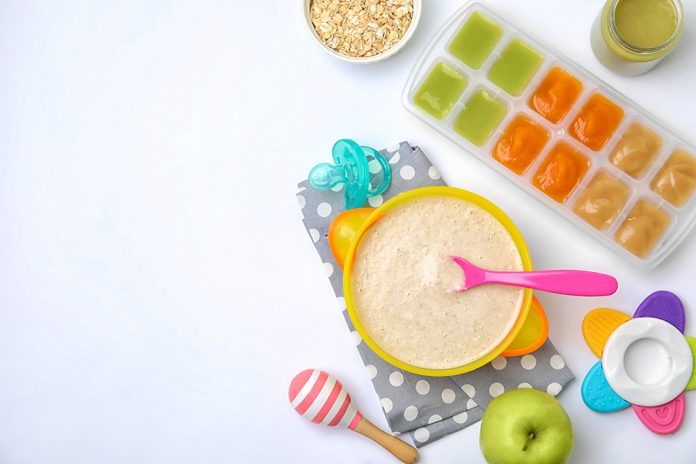This post is also available in: English हिन्दी (Hindi) বাংলা (Bengali)
Grains should be one of the first foods we introduce to our babies when we are weaning them to solids at 6 months.
Why are grains the best first food for babies –
- Grains are rich in carbohydrates which provide the energy babies need as they begin to move around.
- Their high carbohydrate low protein ratio makes them ideal for babies who need energy but must be kept safe from allergy.
- Grains are excellent pre and pro biotics and help the gut to build its population of good bacteria.
- Grains can be turned into a slurry that has a neutral taste and semi-solid texture and consistency which babies accept easily because of their sucking reflex.
- As babies grow and learn to chew and eat, grains can easily be given more texture and taste. This improves speech.
- Once babies get used to eating grains, it becomes easy to start feeding them the food that has been cooked for the rest of the family. This makes life easier for parents.
How to choose grains for your baby’s meals?

- At the age of 7 months start with white rice –
White rice has low protein and fibre content. And because of this it is less likely to cause allergy and will be easier to digest.
2. By the age of 10 months, start adding other grains like wheat, barley, maize, sorghum, ragi and so on.
What to keep in mind when you choose grains at 10 months –
- Choose grains you routinely eat.
- If there is a history of gluten sensitivity or celiac disease in your family postpone the introduction of wheat and other gluten rich grains.
- Choose whole grains rather than refined grains.
What are the grains you can give your baby after 10 months?

- Rice
- Wheat
- Barley
- Oats
- Maize
- Ragi
- Sorghum
- Buckwheat
How to process and cook grains that you give your baby?
- Use milled rice (white rice) at first. This is low in fibre and protein content.
- Use germinated / malted millets and maize. Germination reduces the viscosity of the millet flour and makes it easier for your baby to eat more in every bite. It is also a better source of vitamins and minerals.
Precautions while giving babies grains

- Continue breastfeeding during weaning. Breastmilk coats the gut and prevents allergies.
- Every grain has the potential to cause allergy. Introduce any new grain in very small quantities over a period of several days.
Grains are a great source of energy because they are rich in carbohydrates. However, they are poor in various amino acids which are required by the body to make proteins.
It is therefore important to eat grains in combination with legumes (dals) to compensate for the missing amino acids.
Introduce dals or pulses into your baby’s diet soon after grains and then give your baby dal-rice, khichdi, idli, dosa and so on.
Giving babies only grain, especially if it is a refined grain like white rice or maida, can lead to several deficiencies.
By
Dr Debmita Dutta MBBS, MD

Dr Debmita Dutta MBBS, MD is a practicing doctor, a parenting consultant, and the founder of WPA whatparentsask.com She conducts online and offline workshops on parenting for schools and corporate organisations. She also conducts online and offline prenatal and infant care classes. She is a well-known thought-leader in parenting. Her books on parenting are published by Juggernaut Books and she is frequently quoted in national and international publications of repute. She is renowned for her empathetic and compassionate approach to parenting and her application of physiology and brain science to parenting.
This post is also available in: English हिन्दी (Hindi) বাংলা (Bengali)








